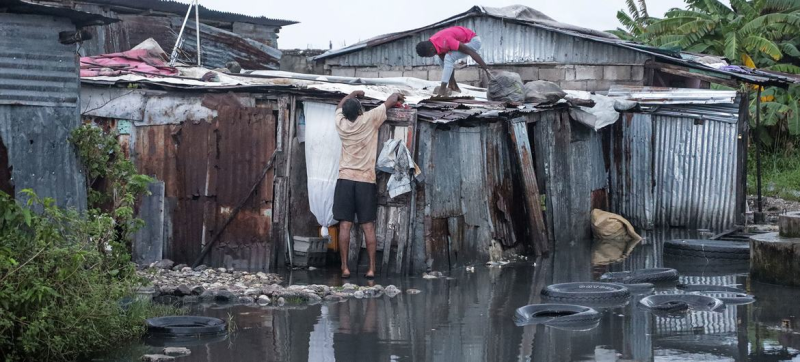- UN Report Calls for New Thinking to Secure a Sustainable Future |
- BNP moves to finalise seat sharing as alliance friction grows |
- BNP plans universal 'Family Card' for all women: Tarique Rahman |
- Tangail saree weaving gets recognition as intangible cultural heritage |
- Chuadanga farmers thrive as cauliflower yields hit new high |
Hurricane Melissa displaces thousands across Caribbean

A man in Les Cayes in Haiti repairs his home which was damaged by Hurricane Melissa.
Hurricane Melissa has left a trail of devastation after sweeping across Jamaica, Cuba, and the Bahamas, with severe effects also reported in Haiti, the Dominican Republic, and parts of Central America, the UN aid coordination office (UNOCHA) said on Thursday.
The hurricane caused widespread damage to homes, infrastructure, and crops, leaving thousands displaced. However, extensive storm preparations by governments, supported by UN agencies and NGOs, appear to have lessened the impact and saved lives in many areas.
In Cuba, the hurricane struck Santiago de Cuba province with winds exceeding 200 km/h and six hours of torrential rain. “Melissa is one of the three most powerful hurricanes ever recorded in Cuba and the strongest worldwide this year,” said Francisco Pichon, UN Resident Coordinator for Cuba, during a press briefing via videoconference from New York.
“More than three million people were exposed to life-threatening conditions, and nearly 240 communities remain cut off due to flooding and landslides,” he added.
Existing vulnerabilities
The storm compounded existing vulnerabilities. Many affected areas were still recovering from last year’s Hurricane Oscar and recent earthquakes, while drought, rising viral diseases, and energy shortages added further strain.
Despite these challenges, Cuba’s civil defence system helped evacuate over 77,000 people to protection centres, including schools temporarily converted into shelters.
Mr. Pichon highlighted the UN’s anticipatory action framework, which pre-positioned relief supplies and personnel before the storm hit. “This mechanism allowed us to respond quickly and ensure that essential goods reached those who needed them most,” he said.
Plans are underway to assist two million people in the coming days, including through food security, health, education, shelter, water and sanitation, and logistics support.
Early preparedness saves lives
In Haiti, the storm’s slow movement triggered flash floods, landslides, and severe crop damage, said Gregoire Goodstein, the UN’s Interim Humanitarian Coordinator.
“At least 24 people have died, 17 were injured, and 18 remain missing,” he reported. Around 15,000 people are currently sheltering in over 120 temporary facilities.
Early preparedness helped save lives. “We deployed emergency stocks, set up evacuation shelters, and sent out 3.5 million early warning messages,” Mr. Goodstein said. “Rapid response teams worked with national authorities to ensure communities could evacuate safely.”
Haiti faces the storm amid an ongoing humanitarian crisis, with 1.4 million people displaced, widespread hunger affecting half the population, and recurring cholera outbreaks.
Mr. Goodstein noted that the UN’s Humanitarian Response Plan is currently 87 per cent underfunded, putting life-saving operations at risk.
“Humanitarian needs remain immense, and international cooperation is crucial,” he said.
The UN continues to coordinate assistance across the Caribbean, supporting both immediate relief and longer-term recovery efforts in the aftermath of Hurricane Melissa.

